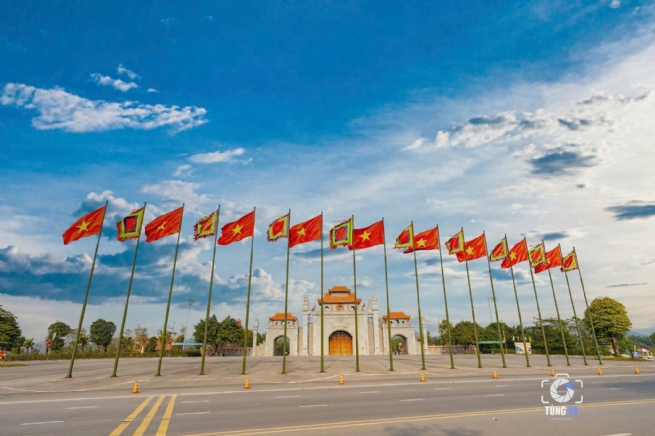3:31:16 PM | 11/21/2025
The merger of Vinh Phuc, Phu Tho, and Hoa Binh into the new Phu Tho province on July 1, 2025, marked a strategic move that opens up outstanding tourism potential. From sacred temples and the melodic Xoan singing to vibrant ethnic villages and modern destinations like Tam Dao and Dai Lai, Phu Tho offers a unique travel experience that combines heritage with contemporary life.

Cultural heritage - the foundation for sustainable tourism
Visitors to Phu Tho today immediately sense the vibrant cultural life in every street, village alley, the resonating drums, and the rising incense smoke. The Hung Kings National Special Historical Site is not only a place to honor the Hung Kings but also a sacred symbol of national roots. Ceremonial incense offerings, melodic Xoan performances, and the colors of traditional festivals provide experiences that are both reverent and intimate.
Phu Tho is also proud of two UNESCO-recognized intangible cultural heritages: the Hung Kings worship and Xoan singing. These represent not only spiritual value but also a foundation for cultural tourism, allowing visitors to deeply explore the nation’s roots and rich spiritual life. Vibrant festivals, intricate handicraft villages, and the distinctive cultural practices of the Muong, Dao, Tay, and Thai ethnic groups create a unique vitality, making every trip a multi-sensory journey.
The merger of Vinh Phuc, Phu Tho, and Hoa Binh into the new Phu Tho province is a strategic move toward sustainable development. Combining midland, mountainous, and lowland areas creates cultural, scenic, and experiential diversity. This not only enriches tourism products but also enables integrated development, connecting heritage sites to form a distinctive tourism circuit.
Villages and nature - the appeal of community tourism
Beyond heritage sites, Phu Tho draws visitors with villages that maintain traditional lifestyles; tourists can walk winding paths through Muong, Thai, or Dao villages, hear gongs ringing, and watch locals weave, craft, or prepare for traditional festivals; this offers the authentic, immersive experience travelers seek, close, genuine, and full of local life.
Representative destinations include Mo Village in Da Bac, Mo Village in Thung Nai, the ancient Hung Lo Village, and Da Bia and Ngoi Villages at Hoa Binh Lake Tourist Area; these sites blend rich cultural identity with pristine natural beauty; visitors can join community activities, enjoy traditional cuisine, and learn to live in harmony with nature, experiences rare in modern cities.
These villages are also important economic resources for local communities. Community-based tourism helps residents increase income, preserve cultural values, develop sustainable livelihoods, and maintain natural landscapes. More than 1.3 million visitors annually experience these villages, demonstrating the model’s success.
The province is also upgrading cultural, spiritual, and ecological tourist sites. The Hung Kings Museum is finalizing provincial-level recognition, and many sites are being planned with consistent landscaping, infrastructure, and environmental standards. Expanded connecting routes are forming chains of distinctive tourism products. Digital promotion through platforms such as the MyPhuTho.vn app, landing pages for night tours of Hung Kings Temple, Hung Lo Ancient Village, and the Hung Kings Historical Site, as well as social media, is bringing Phu Tho closer to both domestic and international visitors.
Vibrant travel experience
In the third quarter of 2025, Phu Tho welcomed about 865,000 overnight visitors, including over 41,000 international guests, generating VND2,620 billion in tourism revenue, up 6% from the same period last year; during the National Day Holiday, the province received around 300,000 visitors; these numbers demonstrate both the appeal and sustainable growth potential of Phu Tho’s tourism sector.
In the coming time, the province plans to develop tourism products tied to the cultural identity of the Land of the Ancestors: spiritual and festival tourism, community and eco-tourism, and resort tourism combined with cultural experiences. Digitizing ethnic minority cultural heritage, supporting community tourism sites to upgrade infrastructure and improve services, and integrating new rural development programs are helping build a green, smart, and sustainable tourism model.
Culture as the foundation, local people as the main actors, and technology as the tool. This is Phu Tho’s approach to building a diverse and vibrant tourism sector. Every village, heritage site, and festival tells a vivid story, bringing visitors back to their roots, offering historical reflection, and showcasing lively contemporary life. Today, with its varied landscapes, culturally rich communities, and ongoing preservation and development efforts, Phu Tho is emerging as one of the most attractive destinations in the midland and northern mountainous regions. Each visit offers a journey of discovery where travelers encounter history, experience present life, and engage with living cultural stories.
By Huong Hau, Vietnam Business Forum